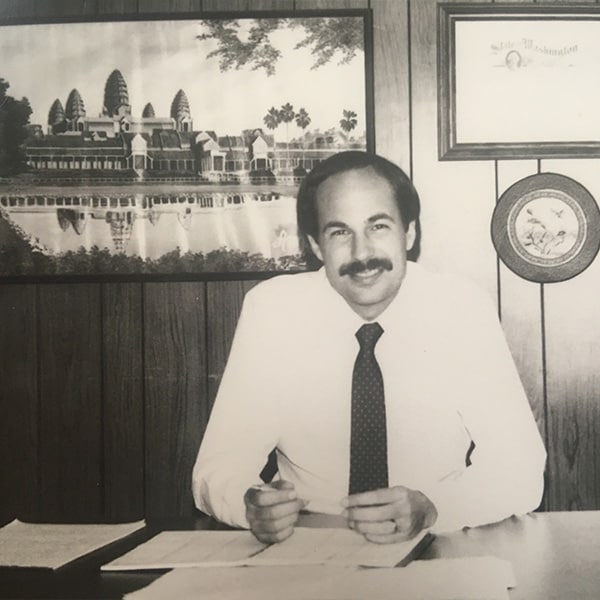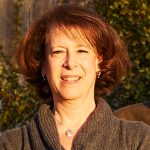Called to Serve: Q&A with Alec Hill, Founding Director of the World Relief Seattle Office
At World Relief, we’ve been welcoming refugees to the U.S. since the national resettlement program began in the 1970s. In 1979, Grady Mangham, who was overseeing our resettlement efforts, signed a contract with the U.S. State Department making World Relief the first and only evangelical organization authorized to resettle refugees at the time. One year later, Alec Hill opened World Relief’s office in Seattle, Washington — one of our first two local U.S. offices.
Hill led the Seattle office from 1980-1985. After five years at the helm, he accepted a professorship at Seattle Pacific University where he also served as Dean of the School of Business and Economics before joining InterVarsity as president. Today, Hill, the author of two books, Just Business and Living in Bonus time: Surviving Cancer, Finding New Purpose, continues to connect with immigrants and refugees as a mentor and friend. In a recent interview he recalled his experiences as World Relief Regional Director in the 1980s.
You were instrumental in World Relief’s response to the refugee crisis of the 1980s. Did you have any memorable encounters with immigrants in your early life that shaped the person you became and gave you the desire to work with displaced people?
My mom was a foreign language teacher. When I was seven years old, we spent a long summer in Saltillo, Mexico, living with a family with 14 kids, while she attended a university. She also led an international student club at her high school, so we had folk from around the world in our home all the time. In addition, we had women from Spain, Uruguay, and Mexico live with us for years. These global exposures stirred my young imagination to other cultures.
After graduating from the University of Washington Law School, I soon realized that I preferred to serve in a justice ministry rather than practice law. At the age of 27, I entered relief work, first with World Concern and then was named regional director for World Relief’s work in Washington, Oregon, Idaho, and Montana. My team resettled 1000 refugees per year through our Seattle and Portland offices. I had a really fabulous team in Seattle — only about ten people — who utilized a church sponsorship model. Volunteers multiplied our effectiveness. Looking back, this was one of the best teams I’ve ever worked with.
How has your work with refugees impacted your understanding of scripture?
Scripture drove me to refugee resettlement. Then refugee resettlement enhanced my understanding of scripture.
God’s concern and compassion for the disenfranchised, for the forgotten, for the person in transition starts at the very beginning and goes all the way through Scripture.
I led a Bible study on Exodus with Cambodians at my church. When we discussed God providing for the Israelites and I began talking about manna, they suddenly started speaking in Khmer, leaving me in the dust. When I asked what just happened, they told me that when they escaped from Cambodia something like hoarfrost came out of the earth and they ate it to survive.
They’re telling me this story about manna that saved their lives. To this day I think about all the stories I learned from them about God’s provision and especially what Exodus meant to them. It changed my view of Scripture.

Looking over the span of years since you first started working in refugee resettlement, can you relate some stories about the positive impact refugees have had on the community in Washington state?
I was invited to World Relief’s 40-year banquet held near Seattle. The featured speaker was a young woman of Vietnamese descent who is a designer and an entrepreneur.
She was talking about how when her dad first came, he would go out with the regional director and give talks. I looked over at her table where her dad was seated and my heart just leapt. He used to be my go-to guy — so articulate and wonderful. And here was his daughter, the featured speaker at the banquet, whose company is employing lots of people, doing great things.
We’d first met in our 20s, now we were men in our late 60s. I went over to him and re-introduced myself. And we both just wept and hugged each other. There was a sense of having found each other again.
What continues to be the impact of your work with World Relief as you move forward through life?
I have never been the same since those five years with World Relief. I continue to have a heartfelt sense of empathy and love for people who have lost everything and who are forced to leave their homes. They have a resilience most of us don’t — they are truly remarkable human beings. These are people we are called to love.
For me, this empathy was instilled by my mom at an early age. And my whole life has been a continuum of loving the diversity of God’s creation and loving people’s stories. And, by the way, I’ll be speaking this weekend at the Cambodian church we planted four decades ago. What joy.

Susan Solomon Yem is an internationally published storyteller. She frequently writes about the refugee experience and her own work in refugee resettlement with World Relief where she also previously served as the New England regional representative.


